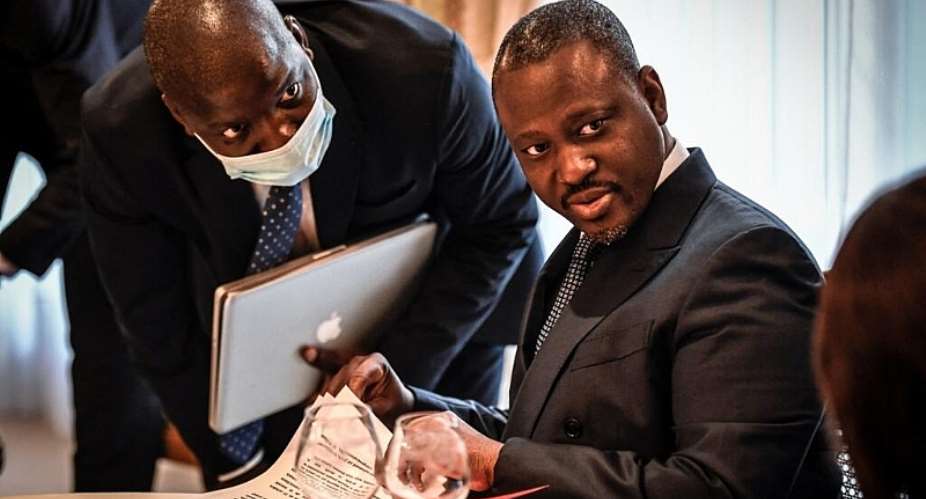The former prime minister of Côte d'Ivoire, sentenced to life in prison for undermining national security, said on Monday that he has been in Niamey since Saturday and met with Niger coup leader Tiani on Sunday. He also announced that he was ending his self-imposed exile, which began in 2019.
"I had the honour of an audience with the president of the Nigerien transition, General Abdourahamane Tiani," said Soro on X, formerly Twitter, adding he had met with other senior officials in a 90-minute exchange.
On Sunday, Guillaume Soro had announced by the same means that he wished to end his exile away from his home.
"I am announcing here and now that I am putting an end to my exile because it's hard for me to live far from my ancestral and native land of Africa," Soro said in a video-recorded address published on social media.
"I refuse to be a fugitive. I am guilty of no crime," he added, saying he wanted to "contribute to the reconciliation" of the country's population, without specifying a return date.
Guillaume Soro was previously right-hand man to President Alassane Ouattara, but the pair fell out in 2019, with the head of state accusing him of fomenting a "civilian and military insurrection".
"Soro has no guarantee at all that he could come back to Côte d'Ivoire," Rinaldo Depagne, West Africa Project Director at International Crisis Group, told RFI. "He's probably trying to put pressure on Ouattara, but it looks like a desperate move from a man who is really tired of being on the run."
The Ivorian authorities haven't reacted.
"He had until now been very quiet," added the Ivorian political analyst Jean Alabro, based in Abidjan.
"These declarations are unexpected, but I bet he is not looking for forgiveness, as he knows that Ouattara is very unlikely to give it to him, but he might want to negotiate with him."
Soro in exile
Soro was the head of an insurgency that controlled the northern half of Côte d'Ivoire in the early 2000s.
He provided crucial military support to Ouattara in his tussle with the then president, Laurent Gbagbo, who was ousted in 2011 after a brutal post-election conflict.
Soro then became Ouattara's first prime minister and in 2012 was named speaker of the National Assembly.
After his fallout with the president and accusations of fomenting insurrection, he was, in another affair, also sentenced in April 2020 to 20 years' jail for handling embezzled public funds.
Soro then went into exile, and an Ivorian court sentenced him in absentia to life imprisonment in 2021.
He spent most of his exile in France, Belgium, and Dubai.
"He remains Ouattara's eternal enemy," experts explained.
Arrest risk
In his first video, Soro also said an attempted arrest against him was made at Istanbul airport on 3 November, in a bid to extradite him to Côte d'Ivoire, adding he had faced many abduction attempts over the years.
He accused President Ouattara of wanting to track him down wherever he is.
“The latest arrest attempt made in Istanbul demonstrates, if necessary, that the only place of peaceful rest that Mr. Ouattara reserves for me is indeed the cemetery,” said the former Prime Minister.
If he returns home, he risks facing arrested.
Last May, Soro announced from exile his intention to run to Côte d'Ivoire for the 2025 presidential election.
“I want to be able to contribute to the reconciliation of the sons and daughters of my country and make my contribution to building peace between the peoples of Africa,” he assured.
- Cote d'Ivoire: Ouattara offers presidential pardon to former leader Gbagbo
Henri Konan Bédié, controversial giant of Ivorian politics, dead at 89
But experts believes he has no chance of getting back into Ivorian politics.
"He has no political party, and no support," Alabro told RFI.
His desperate call could be showing that he is facing illness, and only hopes to come back home to end a lengthy and painful life on the run.
The last presidential election, in 2020, was supposed to "be an opportunity to end a longstanding crisis and hand over power to a new generation", according to analysts at Crisis group, but only led to "a new impasse" instead, while the region are experiencing "destabilising crises".





 Azumah Nelson faces Irchad Razaaly in a match to empower youth
Azumah Nelson faces Irchad Razaaly in a match to empower youth
 Ejisu By-Election: I’m not a traitor, NDC people appreciate me – Independent can...
Ejisu By-Election: I’m not a traitor, NDC people appreciate me – Independent can...
 Some people expect us to be dogmatic, sycophantic supporters of Akufo-Addo even ...
Some people expect us to be dogmatic, sycophantic supporters of Akufo-Addo even ...
 NDC Campaign: James Agyenim Boateng is the right man to handle communications
NDC Campaign: James Agyenim Boateng is the right man to handle communications
 Mahama pledges to contribute to the development of Gonja Kindom
Mahama pledges to contribute to the development of Gonja Kindom
 “Ghanaman Time”: We've normalized the abnormal, accepted the unacceptable — Dots...
“Ghanaman Time”: We've normalized the abnormal, accepted the unacceptable — Dots...
 Bawumia begins nationwide campaign, starts in Eastern Region today
Bawumia begins nationwide campaign, starts in Eastern Region today
 Bawumia kicks off nationwide campaign with “bold solutions” for Ghana's future
Bawumia kicks off nationwide campaign with “bold solutions” for Ghana's future
 You cannot choose your successor; it’s only God who can – Mahama to Akufo-Addo
You cannot choose your successor; it’s only God who can – Mahama to Akufo-Addo
 Ejisu by-election: Vote for independent candidate Kwabena Owusu Aduomi to uphold...
Ejisu by-election: Vote for independent candidate Kwabena Owusu Aduomi to uphold...
